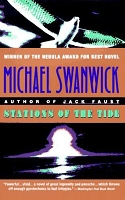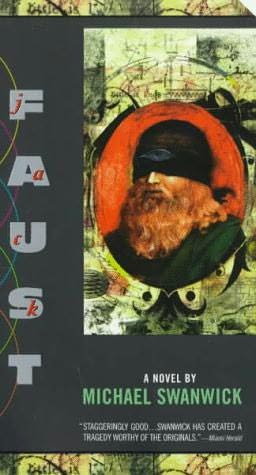

As I read this book one thing came to my mind very quickly, this was going to be another competently written novel which would fail to impress me. Unfortunately, Stations Of The Tide proved my initial gut feeling to be accurate. On the planet Miranda, one on which land is every two centuries drowned by the Jubilee tides, a bureaucrat is sent to track down a magician, a man named Gregorian, who is in possession of forbidden technology. Right from the beginning Gregorian taunts this bureaucrat across the land and rising ocean level of the planet. The planet is fast approaching anarchy. Amidst the interminable and languorous chase scenes, the cat and mouse game that is both subtly and not so subtly played between Gregorian and his pursuer, the bureaucrat is enmeshed into a world which is both alien and too familiar to him. Right from the first chapter this so called educated man is duped. Such a babe in the woods should not have been sent on such a potentially dangerous mission. I wondered where the sting would be, trust me, Swanwick thoughtfully forgets to include one. Sociopathic madmen posing as wizards who offer the gullible rich a chance to change to become aquatic beings who could live out the impending flood are not apprehended by bureaucrats! On his mission our bureaucrat meets ups with people who will forever change his life. The narrative is at times awkward and possesses more than a pinch of self conscious formality. The sex scenes are robust but the entire novel is told through the viewpoint of just the one central character. It really could have done with more variety. When the bureaucrat is called back to the planet after one episode where he loses his composure and reveals his intentions to the press of the planet we are thrown a plot twist. The bureaucrat conducts his own personal investigation within the eternal halls of the Division of Technology. He reasons are to figure who is manipulating his action both on and off planet. The novel is short and the actual finale and final encounter with Gregorian more than confusing. When the briefcase, a construct with sentient capabilities, is given its freedom after the bureaucrat waits out the Jubilee tides, I grumbled with a quiet disbelief. It was nothing more than sentimental tripe being hoisted on machinery! The actual final page is literature that places itself on a pedestal of formulaic quixotic nonsense that I feel should never be emulated. This book varies in its quality from chapter to chapter and it simply lacks a coherent sense of escapist believability I demand from science fiction.


The beginning of the seventeenth century witnesses the birth of a genius. This man, an intellectual well versed in all aspects of classical education and modes of thought due one of his class, realises that all of which he has been taught is bunk. He burns his books, much to this dismay of his teenage apprentice, and retreats into himself. It is then that he meets up with a consciousness, a voice that calls out his name, and exposes to him the universe entire. Did I mention that this voice introduces himself as Mephistopheles?
Right from the first chapter I fell into this book. Magistar Faust has unleashed the devil, but boy o boy! what a devil! This demon (a composite being from a higher energy universe) informs Faust of the limitless possibilities his species has, and with wonderful subtlety proffers Faust information that will usher in a new age of understanding. Mephistopheles openly relays his utter contempt and hatred for the human race, but in return all Faust has to do is listen to him, no more, no less. I just loved the way Swanwick creates a demon that both insinuates insults and challenges to tantalise and repel. He unabashedly uses his powers of prescience and omnipotence to show Faust all that has been, all that is, and all that may come to pass. Faust devours this limitless well of information and with a social alacrity that the decent god fearing German population were totally unprepared for, he ushers in an industrial revolution.
For me some of the strong points of this novel was the humour which the author uses. He exposes and disabuses Faust of all the noble airs and graces he was led to believe were inimical to both men and women. Lasciviousness by nature, cruel by design, avaricious with desire, blinded by religious dogma, the entire dark spectrum of the human gamut is ripped open and wryly deconstructed for Faust to do with as he pleases. However, Faust is an idealist and puts his faith in humanity. As you can imagine, this is not going to be one of those books which champions the human spirit, but it in no real way denigrates it either; it simply shows how seventeenth century mindset's exposed to rapidly increasing technological advancements are unable to cope with this overwhelming change in their lives.
Faust ends up being feared, branded heretical, and despised by those who cannot tolerate his new found genius. However, Mephistopheles is always at his beck and call with advice and insights which never steer Faust in the wrong direction. But where is the rub? How does Faust end up being duped by this preternatural being? As time passes Faust falls in love, and leaves Germany because his true worth is not acknowledged and his designs and creations are bastardised for war. The first half of this novel is excellent, so much wonder at the unknown is examined. How Faust goes about with altruistic notions and motions to better mankind is forever detoured by the ruling elite for their own short sighted benefits. However, the second half of the novel lacks the same cutting edge because the technology which exists is only desultorily examined. Faust knows that all he has brought forward is not used for its more noble intentions, and I guess that is where the rub lies: the road to hell is paved with good intentions.
The final few chapters seemed somewhat distracted from the tone of the previous chapters; leanings on existentialism and the nature of morality and the corruption of power are somewhat cobbled together. This was for the most part an excellent novel which slowly lost its momentum and originality.

| Authors | Awards | Blogs |
| Fanzines | Index | Magazines |
| Publishers | Retailers | Reviews |